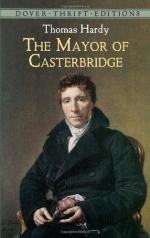“Yes, if you much wish it.”
“I do. He’s an enemy to our house!”
When she had gone he sat down, and wrote in a heavy hand to Farfrae thus:—
Sir,—I make request that henceforth you and my stepdaughter be as strangers to each other. She on her part has promised to welcome no more addresses from you; and I trust, therefore, you will not attempt to force them upon her.
M. Henchard.
One would almost have supposed Henchard to have had policy to see that no better modus vivendi could be arrived at with Farfrae than by encouraging him to become his son-in-law. But such a scheme for buying over a rival had nothing to recommend it to the Mayor’s headstrong faculties. With all domestic finesse of that kind he was hopelessly at variance. Loving a man or hating him, his diplomacy was as wrongheaded as a buffalo’s; and his wife had not ventured to suggest the course which she, for many reasons, would have welcomed gladly.
Meanwhile Donald Farfrae had opened the gates of commerce on his own account at a spot on Durnover Hill—as far as possible from Henchard’s stores, and with every intention of keeping clear of his former friend and employer’s customers. There was, it seemed to the younger man, room for both of them and to spare. The town was small, but the corn and hay-trade was proportionately large, and with his native sagacity he saw opportunity for a share of it.
So determined was he to do nothing which should seem like trade-antagonism to the Mayor that he refused his first customer—a large farmer of good repute—because Henchard and this man had dealt together within the preceding three months.
“He was once my friend,” said Farfrae, “and it’s not for me to take business from him. I am sorry to disappoint you, but I cannot hurt the trade of a man who’s been so kind to me.”
In spite of this praiseworthy course the Scotchman’s trade increased. Whether it were that his northern energy was an overmastering force among the easy-going Wessex worthies, or whether it was sheer luck, the fact remained that whatever he touched he prospered in. Like Jacob in Padan-Aram, he would no sooner humbly limit himself to the ringstraked-and-spotted exceptions of trade than the ringstraked-and-spotted would multiply and prevail.
But most probably luck had little to do with it. Character is Fate, said Novalis, and Farfrae’s character was just the reverse of Henchard’s, who might not inaptly be described as Faust has been described—as a vehement gloomy being who had quitted the ways of vulgar men without light to guide him on a better way.
Farfrae duly received the request to discontinue attentions to Elizabeth-Jane. His acts of that kind had been so slight that the request was almost superfluous. Yet he had felt a considerable interest in her, and after some cogitation he decided that it would be as well to enact no Romeo part just then—for the young girl’s sake no less than his own. Thus the incipient attachment was stifled down.




